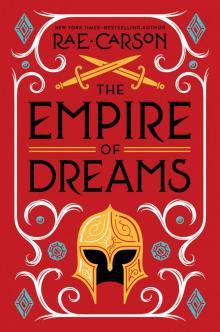- Home
- Rae Carson
The King's Guard Page 2
The King's Guard Read online
Page 2
I glance around for our captain. Mandrano is by the portcullis, his arms crossed, evaluating us. Have we failed already, Captain? Are you itching to tell your lord-commander about this?
If I win here against Lucio, I might fail in reaching my goal, so I drop my guard. “You can thrash me after dinner if you want. But let’s get this done first. Either we wash the training yard, or they wash us out.”
A muscle in Lucio’s jaw twitches. “You’re afraid of me.”
“Yes,” I say, wiping a bit of blood from my temple. “But I’m more afraid of getting cut.”
Fernando steps between us, a bucket in hand. “All right, then,” he says. “Let’s get to work.” And he tosses the water against the wall, purposely splashing the dangling legs of several of the palace garrison, who quickly scuttle back and drop out of sight.
We scrub every speck of those walls while the sun beats down on our heads. Then more buckets appear, and we start our useless work on the ground itself. The skin of my hands burns, and the cut on my head stings with sweat.
Much later, the low, orange sun casts gloom onto the training yard, making it hard to tell which areas are damp with water and which are dark with shadows. The monastery bells toll the dinner hour, and I look up from scrubbing uselessly at dirt to find Captain Mandrano standing over me, fists on his hips.
I blink sweat from my eyes and await his pronouncement. Even through my pants, the skin of my knees is rubbed raw, and my lower back aches. My stomach rumbles loudly.
Mandrano smiles, and his scar makes it a mocking grin. “The lot of you had all day to clean the training yard,” he says, and his voice and gaze seem to focus on me, “and not one of you thought to wash the dummies or the targets. Is that what you think of the Royal Guard? That it does half a job, then quits?”
The soldiers, Tomás and Marlo, shout, “No, my captain!” and carry their buckets toward the south end of the yard.
Mandrano moves away, continuing his inspection. I rise from my knees, sensing Lucio and Fernando at my shoulders. I hope I don’t get saddled with them, as neither is likely to make the cut.
“I could use a glass of wine,” Lucio says under his breath.
“I’d be happy with water and a crust of bread,” Fernando replies.
Mandrano makes a show of inspecting the cleanliness of the far wall, then he says, “I’ll be back before dawn, and I expect it to be done right this time.” He disappears under the portcullis, probably to see his wife, eat a big dinner, and catch some sleep. I think I might hate him.
I point to the bales of hay stacked behind the targets. “We should wash those too,” I say, “before the captain invents the job. While we’re at it, we might as well wash the portcullis and the archway.”
Fernando slumps over with a groan. “Maybe I haven’t given enough consideration to the fine life of a tanner.”
“Straighten up,” I tell him. “Just because you don’t see Mandrano or Enrico doesn’t mean they don’t see you. Assume everything you do is being watched and evaluated.”
Fernando grunts and straightens.
I grab my rag and look for something in the yard that hasn’t already been senselessly scrubbed.
3
WE’RE allowed to stumble into the barracks just before dawn. Captain Mandrano orders us to stow our three possessions—which we preserved by balancing them on empty, overturned buckets while we washed the yard—and only then will we be allowed into the mess for a meal. After that, we’ll be permitted two hours’ sleep. Then our real training will begin.
The recruits’ room is a squat, low-ceilinged rectangle with earthen walls buttressed by thick wooden beams. Alejandro was right—it’s much like a dungeon, with damp, chilly air permeated by the faint scent of rat urine. I console myself with the thought that, after hard days of training in the yard, a damp chill might feel nice.
Three oil lamps hang from the ceiling’s center beam. Twelve rickety cots stretch out from the longer walls, six to a side. Beside each cot is a small chest with two drawers. Above each cot is a hanging peg.
I pick the cot nearest the doorway. No one else wants it, for it’s bound to be the noisiest. But it also might have the freshest air, and I’d rather be aware of what’s going on around me than sleep through it. I hang my brother’s plaque, stash my book in one of the drawers, and flip my quilt out over the length of the cot. The latter earns chuckles from several of the recruits, but Fernando gives it an admiring look.
“A girl back home?” he asks.
“Something like that,” I say in a tone to discourage further questions. Confessing that the queen herself made it for me is not likely to earn any good will with this group.
Once we’ve claimed our space and stowed our belongings, we stand at attention by the ends of our cots while Captain Mandrano inspects us. Tomás and Marlo are praised for their hard work and fine example.
He moves down the line. He tells another recruit that his boots are too worn, that he’ll have to go barefoot until he is outfitted with a proper pair. When I see the recruit’s callused feet, I think that he may be better off without the boots.
Mandrano reaches Lucio. Without a word, he grabs the young man’s amphora of wine and dumps it down the floor drain outside the door.
“The amphora is one thing, the wine is another,” Mandrano tells Lucio, who is almost as big as he is. “And you’re only allowed three things, not four.”
“You could have taken my medallion,” Lucio says. It’s a good luck piece, the image of a Godstone surrounded by a verse from the Scriptura Sancta that asks blessings for the bearer.
Mandrano studies it. “No, you’re going to need that.”
Lucio persists, “I would have drunk the wine and gotten rid of the amphora.”
Stop whining, you stupid oaf.
Mandrano’s contempt for him is, fortunately, beyond words. He comes to Fernando. “You can’t lean your bow against the wall—store it under your bed.”
“But that will ruin it,” Fernando says.
Mandrano’s voice fills the barracks. “Did I ask you for your opinion on weapons? Do you think a recruit knows more about a Guard’s weapons than a twenty-year veteran?”
Fernando bites his tongue for once, but it’s likely more from exhaustion than anything else. Or maybe he’s worried Mandrano will notice the state of his shoes.
Mandrano comes to me last. “That is a lovely quilt, recruit,” he says.
“Thank you, sir.”
“It’s the envy of every little girl in Brisadulce. I saw them sitting on the wall today, staring at that blanket and asking their mothers if they could join the Guard so they could have one just like it. Is that what you want, recruit? You want a Guard full of little girls?”
“If they can fight well enough to defend the king, sir.”
“Are you talking back to me?”
“No, sir.”
“Tuck every bit of that quilt under the mattress, recruit. If I see even the tiniest edge, I will confiscate it and destroy it. Do I make myself clear?”
“Yes, sir.”
I do as he asks as quickly as possible. He inspects everything one more time while we sway unsteadily on our feet, our stomachs growling. Finally, finally, he gives us leave to seek out a meal.
We tumble from the barracks and into the mess with renewed energy, but we stop short as soon as we arrive. The place is empty.
“What did you expect?” Mandrano says. “You shouldn’t have taken so long in the training yard.”
Beside me, Fernando whimpers, and I hope with all the hope inside me that Mandrano did not hear.
“The cooks won’t arrive to begin breakfast for another half hour,” Mandrano says. “You’re free until then.” All nine of us glower at his back as he leaves.
“Now what?” Fernando says. “I guess we could go back to our room and sleep for a bit.”
“I’m not going to risk missing a meal,” says one of the others.
“I could thrash Hector now,” Lucio sugg
ests hopefully.
I swing my legs over the nearest bench and plop my forearms onto the table. “I’m sleeping right here,” I announce. “So I can wake up as soon as the kitchen opens.” I let my head drop onto my arms. Lucio can thrash me if he wants, but I’ll probably just sleep through it.
I wake to a hand shaking my shoulder, and I jump up, reaching for a sword that isn’t there.
“Easy, my lord,” says a high voice.
“Just a recruit now,” I mumble.
A boy with curly hair backs away from me. I blink at him to clear sleep from my eyes. It’s one of the new pages. Adán or Ando or something like that.
Men are filtering into the mess hall. Easy laughter fills the air, along with the sounds of spoons against bowls and benches scraping the floor. I step away, intending to dart toward the meal line, but the page grabs my arm. “Message from the king,” he says. “You’re being summoned.”
A hush settles over the mess hall. Everyone stares at me. Everyone who isn’t glowering, that is. The page holds out a piece of folded parchment.
Alejandro, what have you done?
Captain Mandrano is at my side before I can react, snatching the king’s note from my fingertips. “What’s this about?” he says.
“How should I know?” I snap. “I haven’t read it yet.”
Mandrano’s glare is as hot as a blacksmith’s furnace. My brother Felix used to say that my knives would never be as sharp as my tongue, which was a shame. But seeing Mandrano looking at me with murder in his eyes makes me understand that my sharp tongue will be my downfall unless I learn to control it.
“You can read it, of course,” I say.
He turns it over, a tiny square in his large hands, but the seal stops him. “That’s His Majesty’s mark,” he says. “It’s addressed to you. Only you can open it.”
He means it sincerely, I can tell. The king’s seal is sacred to him.
When he hands it back to me, I tear it open at once. Come immediately is all it says in Alejandro’s fluid, elegant scrawl.
“Damn it,” I say.
A half dozen possibilities run through my mind. Chief among them is an early morning tryst. I used to deliver messages to coordinate his assignations with the court ladies—the errand I hated most. But that can’t be it; he ceased all such behavior after marrying Rosaura.
The collective stares of the Royal Guardsmen press in around me, and I realize it doesn’t matter why I’m being summoned. Everyone will see this as confirmation that I’m the king’s flunky, exempt from the usual standards and behaviors expected of a Royal Guard.
With the seal broken and the message read, Mandrano casts his reservations aside and tears it from my grasp again. “Well, then, squire,” he says, turning the title into an insult. “You’d better go at once.” He stuffs the summons back into my hand and shoves me toward the door. It feels like a permanent dismissal.
The scent of hot, honeyed porridge follows me out of the mess. I’m in the hallway heading toward the palace proper when I hear two Guardsmen talking at my back, loud enough for me to hear.
“Less than a day,” the first one retorts with a sneer.
“He hasn’t washed out yet.”
“He’s walking out the door before he’s sworn in, and that means that he’s washed out. Pay up.”
I’m only a Guard recruit because of Alejandro.
And now, because of him, I may have already failed.
4
I can’t imagine that the barracks will ever feel as much like home as the palace halls, with their worn cobbled floors and sandstone walls warm with torchlight. I pass the kitchens, waving to the staff. They’re doling out leftover bread and cheese from breakfast to children of the palace servants. When the kitchen master sees me, he brandishes a heel of bread at me. My mouth waters, but I keep going.
I stop at a well-lit archway framed with block quartz. Centered in the archway is the desk of Vicenç, Alejandro’s mayordomo—though it is empty. A Royal Guard stands rigid beside it, his face stony. In the hallway just before the desk are several plush couches arranged around a thick rug.
This is the waiting area where all visitors to the royal quarters are received. As a page, I spent hours here, waiting to escort guests as needed. But there are no pages here now. Even the mayordomo is absent. But then I notice the Invierne ambassador sitting on one of the couches, his legs elegantly crossed, and I realize their absence is a deliberate snub.
The ambassador stands upon seeing me. He’s taller even than Enrico, with pale flowing robes, hair like molten gold, and upturned eyes the color of an emerald cove. Like all Inviernos, he has an ageless quality about him that makes him seem unknowable. He is newly appointed, just since the old king’s death, and I don’t remember his name. I resist the urge to back away as he gazes at me with haughty disdain.
I hear voices coming toward us from beyond the desk.
A moment later, Vicenç emerges from the shadows, accompanied by General Luz-Manuel, Conde Treviño, and Lord-Commander Enrico. Three of the five Quorum lords.
Lord-Commander Enrico is out of uniform. His civilian clothes are carefully cut to resemble those of the general and conde, though adorned with gold threads and jeweled buttons to emphasize wealth and station.
“Thank you for your reports, gentlemen,” Vicenç says. He is a sharp-featured man who probably should not have made the decision to draw attention to his nose with a large, gleaming nose ring. “I assure you the king and queen will announce the birth of their heir very soon.” The last statement is the kind of practiced theater that the Invierne ambassador is meant to overhear while he waits. If the royal succession is secure, Joya d’Arena will not be weakened by internal conflict. The message is that we are as strong as ever, and now is a very bad time for Invierne to attack.
“I hope they choose a good name for the child. A strong name,” says Luz-Manuel. The general is a small, balding man, carried to his position by ambition and wits rather than physical prowess. He proved to have a knack for strategy during the skirmishes with Invierne, and Alejandro’s father valued him highly—until one of those skirmishes got King Nicalao killed. Some say the general made a poor decision to flank a smaller, oncoming force, leaving the bulk of his men—including the king—exposed to the larger threat. Luz-Manuel insists the king himself gave the order.
I’ve always wondered about that.
“Perhaps they’ll name him Nicalao,” the general continues, “to honor the martial spirit of the late king.” I barely refrain from rolling my eyes. What if they have a daughter? Then I realize his comment was merely intended to remind the ambassador of Joya d’Arena’s military strength.
Enrico jumps in on cue. “The kingdom will remain stable and strong if— Hector! What in seven hells are you doing here?”
Vicenç appears indifferent to Enrico’s unplanned outburst. After serving three kings, it takes an extraordinary event to rouse him beyond bemused detachment. But the conde is openly furious.
Conde Treviño of Basajuan is a self-aggrandizing man who likes to overspend—thus the problem of Lucio, whom he can neither handle nor dispose of without upsetting the boy’s wealthy father. He seldom leaves Basajuan to come to the capital, and I’m never glad to see him.
Ignoring the conde’s glare, I say to Enrico, “I was summoned, my lord.” I hold up my note.
Enrico snatches it from my hands. “What’s the meaning of this?”
“I don’t know, my lord.”
The general reads over his shoulder. He glances at the Invierno ambassador, who suffers the scrutiny unflinchingly. “Let the boy go, Rico,” the general says after a moment. “We have other things to discuss.”
“And I could use a smoke,” Conde Treviño says. “Let’s talk about that little problem you’re taking care of for me over cigars.”
“Of course,” the lord-commander says. He takes one last glance over his shoulder at me as the general and conde lead him away.
The gem dangling
from Vicenç’s nose ring winks in the torchlight as he sits down to work. He pulls reports from a locked drawer and gets busy ticking off numbers and accounts. I approach him. He barely glances up, grumbling, “What now?”
“I’ve been summoned to the king,” I say.
“Well, fetch yourself to him, boy.”
“That’s not proper procedure, and you know it,” I say, unable to keep the anger from my voice. I am not, at the moment, technically a member of the palace household, and security protocol demands that I be escorted.
He doesn’t look up a second time. “If I don’t have a page or squire to spare at the moment for Ambassador Wafting . . . er, Wind and Thunderstorm”—he makes a vague waving gesture—“then I don’t have one for you. So you can stand there all day, or you can obey his summons.”
“Yes, my lord,” I say, and turn to go.
The Invierno ambassador blocks my way.
“Perhaps I could go with the young gentleman,” he says in a fluid, hissing voice. I’m careful not to make eye contact. “It’s important that I speak to the king today. It will only take a moment.”
“I’m terribly sorry, my lord-ambassador,” Vicenç says, “but this is just an errand boy, not even a member of the palace staff. Look at his uniform! I would never embarrass you by sending you without a worthy escort.” To me, he says, “Hurry on, boy.”
I dash past the Guard, who curls his lip at the sight of my recruit uniform, and I leave the ambassador fuming at my back.
The private quarters of the palace are a maze, deliberately so—no assassin or enemy could make their way in quickly—but I know each turn well, and I head left, past the nobles’ quarters, up the stairs, and around the corner to the queen’s chambers.
5
DR. Enzo, the royal physician, is leaving as I arrive. He wipes sweat from his forehead, looking preoccupied, but forces a smile when he notices me. A smile from Enzo is never a good sign.
“What’s wrong?” I ask.
“I should be asking you that,” he says with forced conviviality, his razor-thin mustache twitching. “Aren’t you supposed to be in the barracks? I didn’t expect to see you again until the inevitable training accident. Did you know that training accidents are disfiguring twenty-three percent of the time?”

 The Crown of Embers
The Crown of Embers The Girl of Fire and Thorns
The Girl of Fire and Thorns Walk on Earth a Stranger
Walk on Earth a Stranger Into the Bright Unknown
Into the Bright Unknown The Bitter Kingdom
The Bitter Kingdom The Rise of Skywalker
The Rise of Skywalker Like a River Glorious
Like a River Glorious The King's Guard
The King's Guard The Empire of Dreams
The Empire of Dreams Most Wanted
Most Wanted The Crown of Embers fat-2
The Crown of Embers fat-2 The King's Guard (fire and thorns)
The King's Guard (fire and thorns) The Girl of Fire and Thorns fat-1
The Girl of Fire and Thorns fat-1 Fire and Thorns 00.7: King's Guard
Fire and Thorns 00.7: King's Guard The Shadow Cats (fire and thorns )
The Shadow Cats (fire and thorns ) The Shattered Mountain (fire and thorns)
The Shattered Mountain (fire and thorns)